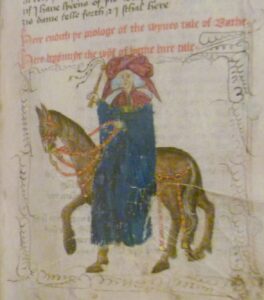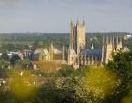This week I’m following up on the blog I wrote a couple of weeks ago about the murder in Canterbury Cathedral of the Archbishop of Canterbury, Thomas Becket, in 1170. I looked at how the relationship between King Henry II and his former Lord Chancellor, which had once been so close, turned to bitterness and hatred, and ended in Becket’s violent death in front of the High Altar. The murdered Becket swiftly became a martyr and a saint – and, almost immediately, miracle cures, ascribed to Becket, were recorded.

Chaucer’s ‘Wife of Bath’ on Pilgrimage to Canterbury c. 1387
Continue reading Freedom v Tyranny: The Afterlife of Thomas Becket
Please share this page...
